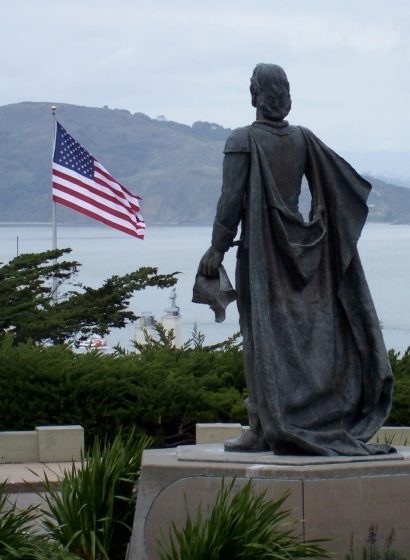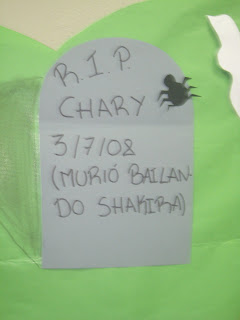Yesterday was Columbus Day, known here in Spain as the
Día de la Hispanidad (Hispanic Day). The city of Granada celebrated with a parade, complete with two marching bands, an enormous Madonna, and many suited procession participants; in Madrid, I’ve read, the festivities include appearances by the Spanish royal family,
an air show, and a military parade.
But what exactly are we celebrating, and why?
One way to approach the question is by considering the different names the holiday is known by around the world. As a very wise person once told me, words are never innocent, and naming is an act of creation that aims to establish a certain version of truth. That being said, onto the names.
Columbus Day (and the anti-Columbus Day movements)In the U.S., the holiday is commonly known as Columbus Day. This is fairly straightforward: as the name indicates, we are commemorating the day that Christopher Columbus made landfall in the Americas: October 12, 1492 in the Julian Calendar. As children in the States, we are taught that Columbus
discovered America, and celebrate his journey of almost mythical proportions across the sea "through sunshine, wind and rain" to the New World. Like the Founding Fathers, he is immortalized in statues and monuments, like this one I recently saw at Coit Tower in San Francisco:

Standing tall and majestic on the summit of Telegraph Hill, Columbus seems to be surveying the expanse of the San Francisco Bay, the American flag flying high before him. Perhaps the crucifix-laden explorer’s juxtaposition with the American flag over this West Coast bay is the symbol par excellence of the transformation of Columbus into a mixed and paradoxical metaphor in the U.S.: the epic oversea adventure of the Niña, Pinta, and Santa María as precursors to the voyage of the Mayflower; the quest for gold, glory, and later, expansionist power for the Crown as models for American manifest destiny; the triumph of Christianity over the savagery of the Americas as a reaffirmation of the nation’s Christian values (and a contradiction to the ideals of religious freedom).
Many people in the U.S. recognize the inconsistencies of celebrating Columbus while we laud life, liberty, and justice for all. In Berkeley, October 12 is celebrated as Indigenous People’s Day; in Denver, protesters are a yearly fixture at the Columbus Day parade; in Hawaii, advocacy groups reject the local version of the holiday, Discoverer’s Day, by celebrating indigenous cultures; in South Dakota, the holiday is Native American Day.
Day of the Race and Hispanic DayNames emphasizing native cultures, such as those just mentioned and the Day of Indigenous Resistance in Venezuela (adopted following the 2002 arrival of Chávez to the presidency) can be contrasted with the more generic and less
overtly political names Día de la Raza ("Day of the Race") and Día de la Hispanidad used in most of Latin America and in Spain, respectively.

Columbus Walk in Caracas, where the statue was knocked down by protesters in 2004.
The name "Day of the Race" originated in 1913 in a publication by the Unión Ibero-Americana in Madrid, with the holiday first being celebrated the following year by the same organization. The governments of Argentina and Spain followed in declaring the day a national holiday in 1917 and 1918, respectively. Implied by the name is the argument that what unites Spain and Latin America is a common racial heritage. For the Mexican ideologue and politician José Vasconcelos Calderón, this common racial heritage was what he called the
raza cósmica ("the cosmic race"): a mixture of the "Black, Indian, Mongol, and White" races that resulted from the Spanish colonization of the Americas. According to his famous book of the same title, the "object of the new and old continent is much more important [than the project of English colonization]. Its predestination: to fulfill the mission of becoming the cradle of a fifth race in which all of the world’s peoples will fuse" (Calderón). Though Calderón took many positions on race that we’d now find absurd and offensive, his observations about racial mixing and the resulting cultural syncretism were important contributions to Latin American political thought.
Conversely, the concept of race as a unifying characteristic of Spain and Latin America was rejected by Ramiro de Maeztu, a Spaniard who in 1931 argued that the holiday should be celebrated as "Hispanic Day." According to Maeztu, "[h]ispanics are, then, all of those peoples who owe their civilization or their existence to the Hispanic peoples of the [Iberian] Peninsula.
Hispanidad is the concept that includes them all" (Maeztu).
Hispanidad, he argues, "is not a race" since "its composed of people of the White, Black, Indian, and Malay races, and their combinations." Maeztu next rejects Hispanic identity being a question of geography, "speaking the same language or of a shared community of origin, nor is it adequately expressed by calling it solidarity." Nevertheless, he believes that though the "spirit of Hispanidad is somewhat weak, it lives on. It manifests itself from time to time through expressions of solidarity and more, of community." It is not until the last paragraph of the text that Maeztu’s tautological definition is finally clarified: the Hispanic community is unified
spiritually, by its Catholic heritage, which the author believes should also be the direction of the future (Maeztu).
That religion (
a religion) is proposed as the key unifier of the Hispanic world in this foundational document of the holiday strikes me as very clearly problematic, and exclusivist: what about the very real religious diversity of the Latin world?. Still, in function, at least as the holiday is celebrated here in Spain, it is true that Catholicism
does play a part in the festivities, such as the Madonna I mentioned in Granada’s parade.
So, it seems to be the case that all of the holiday’s names—Columbus Day, Day of the Race, Hispanic Day—are all beset with ambivalence. Are we celebrating, and do we want to celebrate a man who brought epidemic illness and destruction to a continent, a socially constructed concept that can be linked to many of the great injustices of human history, or a religious tradition that does not fully explain the diversity of Spain and Latin America? It seems that we are left with quite a dilemma, one which seems to me impossible to resolve. In the end, perhaps our best option is just to be aware of the problematic connotations of the holiday, its name, and its history, and to endeavor to approach it critically…while sitting back and enjoying the parade.
Interesting readings to peruse...Columbus’s journal of his voyages to the Americas, as presented/edited by Bartolomé de las CasasColumbus’s first letter to Santagruel, announcing the discoveryThe complete children’s poem about ColumbusSourcesCalderón, José Vasconcelos. "Prólogo."
La Raza Cósmica. Misión de la raza iberoamericana. Notas de viajes a la América del Sur. Barcelona: Agencia Mundial de Librería, ~1926.
Proyecto Filosofía en español. 27 October 2005. La Fundación Gustavo Bueno. 13 October 2008
http://www.filosofia.org/aut/001/razacos.htm.
"Columbus Day."
Wikipedia. 13 October 2008. Wikimedia Foundation, Inc. 13 October 2008
http://en.wikipedia.org/wiki/Columbus_Day.
"Día de la Hispanidad."
Proyecto Filosofía en español. 27 October 2005. La Fundación Gustavo Bueno. 13 October 2008
http://www.filosofia.org/ave/001/a224.htm.
"Fiesta de la Raza."
Proyecto Filosofía en español. 27 October 2005. La Fundación Gustavo Bueno. 13 October 2008
http://www.filosofia.org/ave/001/a220.htm.
"José Vasconcelos Calderón."
Proyecto Filosofía en español. 31 March 2008. La Fundación Gustavo Bueno. 13 October 2008
http://www.filosofia.org/ave/001/a225.htm.
"José Vasconcelos Calderón."
Wikipedia. 24 September 2008. Wikimedia Foundation, Inc. 13 October 2008
http://es.wikipedia.org/wiki/Jos%C3%A9_Vasconcelos_Calder%C3%B3n.
Maeztu, Ramiro de. "La Hispanidad."
Acción Española I.i. Dec. 1913: 8-16.
Proyecto Filosofía en español. 8 May 2006. La Fundación Gustavo Bueno. 13 October 2008
http://www.filosofia.org/hem/193/acc/e01008.htm.






























